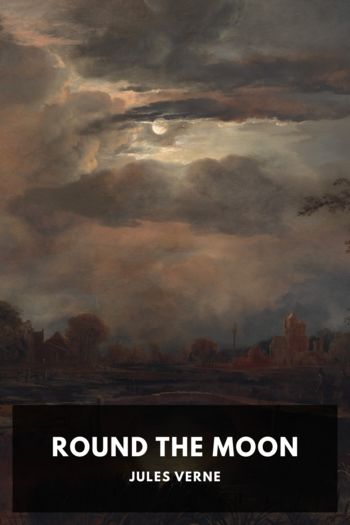Topsy-Turvy by Jules Verne (best book recommendations .txt) 📕

- Author: Jules Verne
Book online «Topsy-Turvy by Jules Verne (best book recommendations .txt) 📕». Author Jules Verne
“One hundred and ninety-nine cents,” repeated the public auctioneer. “We will sell it,” and his hammer fell on the table before him. “One hundred and ninety-nine,” cried the helper. “Sell it! Sell it!” And everyone was looking at the representative of the N.P.P.A.
That surprising gentleman was blowing his nose on a large bandanna handkerchief, which nearly covered his whole face. Mr. J. T. Maston was looking at him intently, and so was Mrs. Evangelina Scorbitt. It could easily be seen by their anxious faces how much they tried to supress their violent emotion. Why was Forster hesitating to outbid Major Donellan? As for the imperturbable Forster, he blew his nose a second time, then a third time, with the noise of a real foghorn. But between the second and third blow he said as quietly as possible, with a modest and sweet voice. “Two hundred cents!”
A long shudder went through the hall. Then the American backers began to make such a noise that the very windows trembled. Major Donellan, overwhelmed, ruined, disappointed, had fallen into a seat by the side of Dean Toodrink, who himself was not in a much better condition. Two thousand miles at this price made the enormous sum of $814,000 and it was apparent that the credit of England did not permit them to overreach it.
“Two hundred cents,” repeated the auctioneer. “Two hundred cents,” said Flint. “Once, twice,” said the auctioneer. “Does anybody go higher?” Major Donellan raised himself by a strong effort and looked wistfully at the other delegates. These only looked back their hope that by his bidding the Arctic region would escape the American bidder and would become the property of the European powers. But this was his last effort. The Major opened his mouth, closed it again, and in his person England sat down on itself. “Hip, hip, hurrah for the United States,” roared the winners for victorious America. And in one instant the news of the purchase ran all over Baltimore, and by telegraph all over the United States, and by cable all over the Old World. Thus it was that the N.P.P.A. through the agency of William S. Forster, became the proprietor of the Arctic domain, including everything above the eighty-fourth parallel. The next day when Mr. Forster went to make his deposit for his purchase the name he gave was Impey Barbicane and the name of the house was Barbicane & Co.
In Which Old Acquaintances Appear to Our New Readers, and in Which a Wonderful Man Is DescribedBarbicane & Co. The president of a gunning club. And really what had gunners to do in such an operation? You will see. Is it necessary to present formally Impey Barbicane, President of the Gun Club, of Baltimore, and Capt. Nicholl, and J. T. Maston, and Tom Hunter with the wooden legs, and the lively Bilsby, and Col. Bloomsberry, and the other associates? No, if these strange persons were twenty years older than at the time when the attention of the world was upon them they had always remained the same, always as much incomplete personally, but equally noisy, equally courageous, equally confusing when it was a question of some extraordinary adventure. Time did not make an impression on these gunners; it respected them as it respects cannons no longer in use, but which decorate museums and arsenals. If the Gun Club had 1,833 members in it when it was founded, names rather than persons, for most of them had lost an arm or leg, if 30,575 corresponding members were proud to owe allegiance to the Club, these figures had not decreased. On the contrary, and even thanks to the incredible attempt which they had made to establish direct communication between earth and moon, its celebrity had grown in an enormous proportion. No one can ever forget the report on this subject which was made by this Club and which deserves a few words of mention here.
A few years after the civil war certain members of the Gun Club, tired of their idleness, proposed to send a projectile to the moon by means of a Columbiad monster. A cannon 900 feet long, nine feet broad at the bore, had been especially made at Moon City and had then been charged with 400,000 pounds of guncotton.
From this cannon a small cylindro-conical bomb had been flung towards the stars with a pressure of six millards pounds per square inch. After having made a grand curve it fell back to the earth only to be swallowed up by the Pacific Ocean at 27° 7′ of latitude and 41° 7′ of longitude, west. It was in this region that the frigate, Susquehanna, of the American Navy, had fished it up to the surface of the ocean, to the great comfort of its occupants. Occupants? Yes, occupants; for two members of the Gun Club-its President, Impey Barbicane, and Capt. Nicholl-accompanied by a Frenchman well known for his boldness in such cases, had been in this flying-machine. All three of them came back well and healthy from this dangerous trip. But if the two Americans were here ready to risk any similar thing, the French Michel Ardan was not. On his return to Europe he brought a fortune with him, although it astonished a good many people, and now he is planting his own cabbage in his own garden, eating them and even digesting them, if one can believe the best-informed reporters.
After this discharge of the cannon, Impey Barbicane and Capt. Nicholl had lived on their reputation





Comments (0)